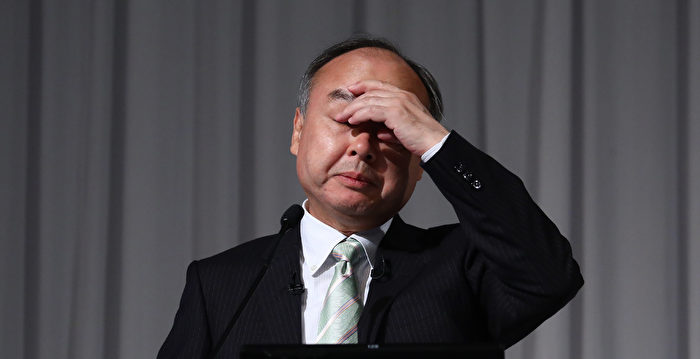[EpochTimesNovember92021](Epoch Times reporter Wang Xiang comprehensive report) Masayoshi Son, the founder and CEO of the Japanese investment fund SoftBank Group, said on Monday (November 8) that it was suppressed by the CCP Under the influence of Chinese technology companies, Softbank suffered a “blizzard in the cold winter.”
SoftBank announced on Monday that its net sales for the second quarter were 1.5 trillion yen (13.1 billion U.S. dollars) and a net loss of 397.94 billion yen (3.5 billion U.S. dollars), which was the first loss in 18 months.
In addition, due to investment losses in China, SoftBank’s Vision Fund lost as much as $10.5 billion in the second fiscal quarter, which was the fund’s worst performance since its establishment in 2017.
Sun Zhengyi used a picture of a blizzard as the opening remarks at Monday’s financial report conference. What was the reason for the shock? “One word: Alibaba.” He said.
Sun Zhengyi said that a big factor affecting investment income is the sharp drop in the stock price of Chinese e-commerce company Alibaba.
SoftBank is one of Alibaba’s shareholders, and Alibaba has long been the jewel in the crown of SoftBank’s investment portfolio. Sun Zhengyi and Alibaba’s co-founder Jack Ma are also close friends.
More than 20 years ago, Sun Zhengyi invested US$20 million in Alibaba. When Alibaba went public in 2014, SoftBank’s investment rose to US$60 billion, accounting for approximately 60% of SoftBank’s net assets.
In October 2020, Jack Ma delivered a speech in Shanghai, accusing the Chinese Communist Party’s financial regulators of stifling innovation. Since then, the authorities have cracked down on Jack Ma’s business empire. In the two days before its financial technology company Ant Financial plans to go public on November 5, the regulator suspended its $37 billion listing plan, ordered the reorganization of Ant Financial, and conducted antitrust investigations on Alibaba’s business. , And finally imposed a fine of US$2.75 billion on Alibaba in April 2021.
Subsequently, the Chinese authorities’ crackdown spread to the entire private sector. Beijing has strengthened its supervision of companies in the technology, real estate, gaming, education, cryptocurrency, and financial sectors, and companies in these industries have suffered heavy losses.
Take Alibaba as an example. In the past year, its market value has lost approximately US$400 billion, and its share price in the July-September quarter has fallen by 35%.
In addition, SoftBank has also invested heavily in other technology companies in China, such as the ride-hailing giant Didi Chuxing and Shell Search. These companies have been dragged down by China’s domestic policies and their stocks have plummeted after they went public. The regulatory actions of the Chinese Communist Party have harmed large foreign investors such as SoftBank.
However, the billionaire is still optimistic about the future. Sun Zhengyi admitted that the latest loss has formed a huge contrast with the booming development of the previous fiscal year; at the same time, he also confirmed that SoftBank is reducing its dependence on investment in China.
Sun Zhengyi said that the fund has many “golden eggs” this year, referring to a series of companies in its investment portfolio that plan to go public.
One of them is the Indian financial technology company Paytm, which has announced an initial public offering (IPO) on Monday. This will be the largest IPO in India’s history, and it is expected to start trading next week.
“Paytm should grow substantially,” Sun Zhengyi said when answering a question about the valuation of the Indian company. “For us, their IPO should be a major event.”
In addition, Sun Zhengyi said that the overall investment of the Vision Fund is still increasing, and the investment portfolio has also been constantly changing.
Kirk Boodry, an analyst at research institute Redex Research, said in a note to clients: “The Chinese (CCP) government has no sign that this regulatory action has ended, which is uncertain about the future of Chinese technology. It may continue for a while.”
As of the end of the quarter, the Vision Fund has invested US$33.5 billion in 157 global start-ups, of which 8 have been listed. In contrast, the Vision Fund has invested in 95 companies in Phase 1, of which more than two-thirds have been listed or exited.
SoftBank is currently focusing on investing in Phase 2 of the Vision Fund, which has US$40 billion in committed capital. At the same time, SoftBank is also preparing to invest up to US$8.8 billion in the next year to repurchase 14.6% of its shares.
Editor in charge: Lin Yan#
.
